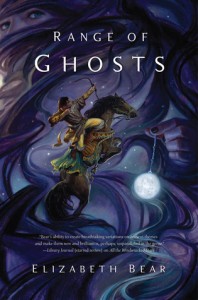“Range of Ghosts” by Elizabeth Bear
 I first heard of Range of Ghosts on John Scalzi’s blog. Like with Throne of the Crescent Moon (also a discovery via Scalzi’s Big Idea series), I was intrigued by the idea of an epic fantasy that eschews a Euro-centric setting and the “restore the rightful monarch” type plot.
I first heard of Range of Ghosts on John Scalzi’s blog. Like with Throne of the Crescent Moon (also a discovery via Scalzi’s Big Idea series), I was intrigued by the idea of an epic fantasy that eschews a Euro-centric setting and the “restore the rightful monarch” type plot.
Range of Ghosts is set in a world with cultures similar to eastern Europe and Asia – from Turkey to Mongolia to China. The skies are different in each land, depending on who the ruler is and what they believe. In the country of the Eternal Sky, The Great Khagan has fallen and there was a bloody civil war for his succession between Temur’s usurping uncle Qori Buqa has prevailed, which means Temur, the rightful heir now that his brother has been killed, has to flee for his life. But it’s not just enough to hide outside the borders of the Khaganate – Qori Buqa is consorting with dark and dangerous powers and has his eyes set on conquering the world. Meanwhile, Samarkar, who was once a Rasan princess, has given up her title for the real power of a wizard of Tsarepheth. Together they form an unlikely alliance that just might save the world.
The setting of this book makes it really come to life – from the stark and desolate steppes and mountains to the splendour of the city of Tsarepheth. Bear accomplishes the equivalent of paragraphs of description in just a few well chosen words. This also applies to her characters, she paints in broad but precise strokes and is very matter of fact about what they’re thinking or how they feel, but we get to know them very well. The societies and customs are very well described – Bear takes care to mention why certain things are the case, which I love!
The breadth of characters is also great; especially of women. Despite being a pretty traditional male dominated world, males are heavily outnumbered. There’s the new wizard Samarkar who risked death for power, Hrahima the human tiger (Cho-Tse) adventurer (who reminded me of Pyanfar from The Pride of Chanur), Tsering the wise wizard, Payma the courageous, young, and pregnant harem member, Edene the stubborn Qersnyk woman that refuses to let her spirit be broken, the nomadic “king” Tzitzik, Saadet the loyal servant and assassin, Nilufer, who won herself a small kingdom in a story that has become folklore – and even Bansh the mare. Of course there are plenty of men too, but they tend to be more stereotypical – probably because there are a lot more stereotypes in fantasy that apply to men. Despite this large cast of characters, the book never gets weighed down and most of the characters have their own unique voice.
The plot seems fairly straightforward at first, but takes some delightful twists and turns along the way. People’s motivations are not what they seem, and there’s a fair amount of scheming. Characters make their own choices and are proud of it. (I’m usually annoyed by stories in which heroism is largely a matter of circumstance and luck – Tad Williams, I’m looking at you.)
Although we get a climactic battle and an ending, it’s fairly apparent that this is not a stand alone book. The ending isn’t exactly a cliff hanger, but it definitely leaves you in anticipation. If that sort of thing bothers you, you should probably wait for the next two books to come out before you read it. But you should definitely read it!

Pingback: “Karen Memory” by Elizabeth Bear | Just a World Away